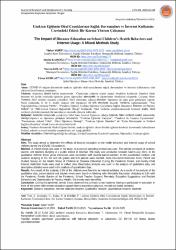Uzaktan eğitimin okul çocuklarının sağlık davranışları ve internet kullanımı üzerindeki etkisi: Bir karma yöntem çalışması
Citation
Yurt, S., Kadıoğlu, H., Kolaç, N., Kubilay, F. (2025). Uzaktan Eğitimin Okul Çocuklarının Sağlık Davranışlarına ve İnternet Kullanımlarına Etkisi: Karma Araştırma. Hemşirelikte Araştırma Geliştirme Dergisi, 27(1), 51-68.Abstract
Amaç: COVID-19 salgını döneminde uzaktan eğitimin okul çocuklarının sağlık davranışları ve internet kullanımına olan
etkilerini belirlenmesi amaçlandı.
Yöntem: Araştırma deseni karma araştırmadır. Örnekleme yöntemi olarak amaçlı örneklem kullanıldı. İstanbul ilinde
bulunan bir devlet okulunda öğrenim gören öğrenciler, ebeveynler ve öğretmenler örneklemi oluşturdu. Çalışma, Mart Temmuz 2021 tarihleri arasında yürütüldü. Nitel yöntemde, öğrenci-ebeveyn -öğretmen ile odak grup görüşmesi yapıldı.
Nicel yöntemde, 3. ve 4. sınıfta okuyan 246 öğrenciye ve 876 ebeveyne ulaşıldı. Verilerin toplanmasında; “Yarı
Yapılandırılmış Görüşme Formu”, “Pandemi Dönemi Uzaktan Eğitimde Çocukların Sağlık Durumları Ebeveyn ve Öğrenci
Anketi” ve “Aile-Çocuk İnternet Bağımlılık Ölçeği” kullanıldı. Nitel verilerin çözümlenmesinde betimsel analiz, nicel
verilerin çözümlenmesinde ise tanımlayıcı istatistik yöntemi kullanıldı.
Bulgular: Analizler sonucunda, çocukların %0,6’sının internet bağımlısı olduğu bulundu. Nitel verilerin analizi sonucunda,
ebeveyn-öğrenci ve öğretmen görüşleri sonucunda; “Uzaktan Eğitimle Tanışma”, “Pandemi ile Yaşama Uyumlanma”,
“Pandeminin Ailesel Yükü”, “Okul Öğretmen Desteği”, “Uzaktan Eğitim Önerileri” ve “Rutin Davranışlar ve Fiziksel
Sağlıkta Bozulma” olmak üzere altı tema belirlendi
Sonuç: Pandemi döneminde ilkokul öğrencilerinin, uzaktan eğitimle ekran önünde eğitime katılmak durumunda kalmalarının
fiziksel, ruhsal ve sosyal sorunlar yaşamalarına yol açtığı görüldü. Aim: The study aimed to determine the effects of distance education on the health behaviors and internet usage of school
children during the COVID-19 pandemic.
Method: A mixed design was used in the study. A purposive sampling method was used. The sample consisted of students,
parents, and teachers studying at a public school in Istanbul. The study was conducted between March-July 2021. In the
qualitative method, focus group interviews were conducted with student-parent-teachers. In the quantitative method, 246
students studying in the 3rd and 4th grades and 876 parents were reached. Semi-Structured Interview Form, Parent and
Student Survey on the Health Status of Children in Distance Education During the Pandemic Period, and Family-Child
Internet Addiction Scale were used to collect data. Descriptive analysis was used in the analysis of qualitative data, and
descriptive statistics were used in the analysis of quantitative data.
Results: As a result of the analysis, 0.6% of the children were found to be internet addicted. As a result of the analysis of the
qualitative data, parent-student and teacher views were found on Meeting with Remotely Education, Adapting to Life with
the Pandemic, Family Burden of the Pandemic, School Teacher Support, Remotely Education Suggestions and Routine
Behaviors and Deterioration in Physical Health. Six themes were identified.
Conclusion: During the pandemic period, it was observed that primary school students' having to participate in education in
front of the screen with remote education caused them to experience physical, mental and social problems.
Source
Hemşirelikte Araştırma Geliştirme DergisiVolume
27Issue
1URI
https://dergipark.org.tr/tr/pub/hemarge/issue/91362/1571078https://doi.org/10.69487/hemarge.1571078
https://hdl.handle.net/20.500.12780/1135
Collections
- Makale Koleksiyonu [40]


















